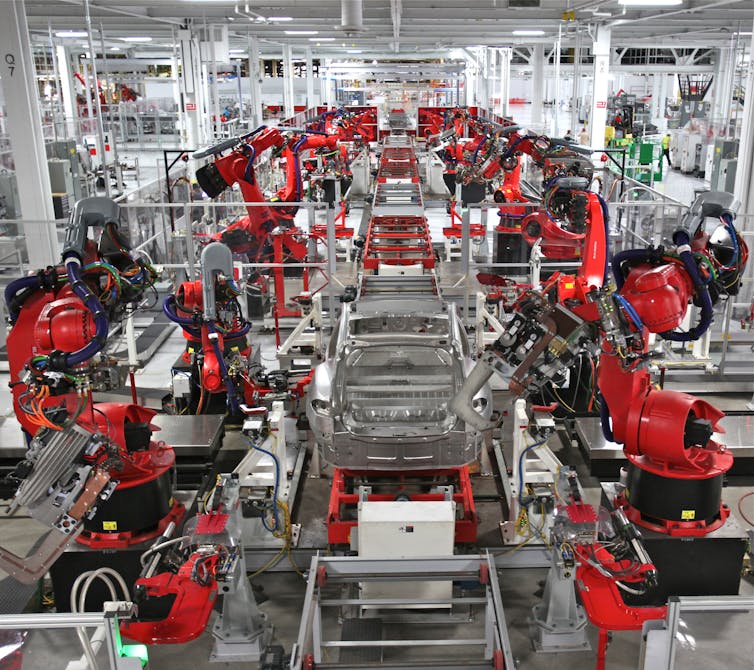Disruptive technologies are nothing new. From the development of steam power in the early 1800s to today’s digitally-enriched world, the impact of technology on the employment landscape has been substantial.
What is new is the speed, extent and unpredictability of modern digital technology-induced disruption, and that this rate of change is dramatically increasing.
More importantly, these changes are impacting the employment landscape at all levels. Having a university degree or entering a profession is no longer a guarantee of a rich and productive working career.
So the question is: if you were about to leave school and begin a university degree or embark on your career, what should you study or do in order to give you the best chances of weathering future technology-induced disruption?
Disruptive change
Technology is changing the employment landscape in a number of ways that are affecting many careers.
Robotics and smart technologies are increasingly able to perform high level, cognitively complex tasks, which impacts a lot of skilled jobs. For example, IBM is working with the Cleveland Clinic in the US to train Watson (IBM’s “thinking” computer) to become board-certified in medicine.

Similar technologies are also encroaching on other white-collar and professional jobs. Oxford University researchers have recently suggested that, in certain instances, the computerised results of complex non-routine cognitive tasks are superior to human “experts” because they do not have our biases.
Their research on the likelihood of technology disrupting more than 700 occupation categories makes for gripping reading for those who take their future career prospects seriously. The researchers suggest that sophisticated digital technologies could substitute for approximately 140 million full-time knowledge workers worldwide in the near future.
Anyone whose work can be outsourced to low-cost countries could also be at risk, such as we’ve already seen in manufacturing, medical radiology and even legal services. Accounting, engineering or architectural design services are also increasingly being offered from low cost countries at a fraction of the cost.
With the global market size of outsourced services standing at more than US$100 billion, the outsourcing industry is already big business.
Career planning
Earning a university degree is increasingly becoming the default position of many school leavers, thus eliminating the point of difference a degree once offered. So holding a degree is no longer enough to guarantee a job.
While the personal benefits of acquiring knowledge are indisputable, the hypothesis that attending a university will result in a net positive return in the investment in time and money is less so.

So the challenge facing anyone at the start of their working life lies in finding a career that will be rewarding, fulfilling and, more importantly, resilient, not just resistant to change. Individuals wishing to be successful in their careers should expect to take a more deliberate and planned approach, and regard their career as their own business.
Being employed is no different to running your own business, in that you are deriving an income from your one client – that being your current employer. Most importantly, while your current employer may dictate the terms of your employment, you should be the one in charge of your career. Employees need to think of themselves and their careers as if it were a business enterprise – that must be evolved, grown, sometimes re-directed and above all – protected.
The question is: can you recognise these career-shaping changes before your employer notices them? If so, you’re well down the path of building career resilience.
Choosing a career
So what to study or train in? There are a number of trades and professions that are likely to be more resilient to automation and/ or outsourcing and can enable you to run your career like a business.
A useful guide is to consider work that fulfils a number of criteria. These include:
The delivery of a service in real-time
Being physically present at the point of service delivery
The need for a high degree of skill, training and experience, and
There is likely to be a sustained need for your service.
For example, as an electrician, you have to be trained and certified to handle live electrical services as well as be on-site to do the job. It is also an excellent foundation for the subsequent acquisition of complementary or supplementary skills and experience that reinforce your future employability prospects.
You could expand into fields such as electronics, control systems, high voltage and industrial systems, communications or electrical engineering – any one could open up rewarding career options as well as protecting your future earning potential.
Other examples of careers that meet these criteria include nurse, physiotherapist, plumber, special needs teacher, surveyor, veterinarian, air traffic controller, surgeon or firefighter. All are highly skilled and hands-on, and are unlikely to be replaced by machines any time soon.
Even though many of these careers exist in constantly evolving environments that are themselves rapidly changing, the fundamentals remain: none are at high risk of being outsourced overseas or completely automated. The same can’t be said of programmer, legal aid or accountant.

